The AMD Ryzen Threadripper 3960X and 3970X Review: 24 and 32 Cores on 7nm
by Dr. Ian Cutress, Andrei Frumusanu & Gavin Bonshor on November 25, 2019 9:05 AM ESTCPU Performance: Web and Legacy Tests
While more the focus of low-end and small form factor systems, web-based benchmarks are notoriously difficult to standardize. Modern web browsers are frequently updated, with no recourse to disable those updates, and as such there is difficulty in keeping a common platform. The fast paced nature of browser development means that version numbers (and performance) can change from week to week. Despite this, web tests are often a good measure of user experience: a lot of what most office work is today revolves around web applications, particularly email and office apps, but also interfaces and development environments. Our web tests include some of the industry standard tests, as well as a few popular but older tests.
We have also included our legacy benchmarks in this section, representing a stack of older code for popular benchmarks.
All of our benchmark results can also be found in our benchmark engine, Bench.
Speedometer 2: JavaScript Frameworks
Our newest web test is Speedometer 2, which is a accrued test over a series of javascript frameworks to do three simple things: built a list, enable each item in the list, and remove the list. All the frameworks implement the same visual cues, but obviously apply them from different coding angles.
Our test goes through the list of frameworks, and produces a final score indicative of ‘rpm’, one of the benchmarks internal metrics. We report this final score.
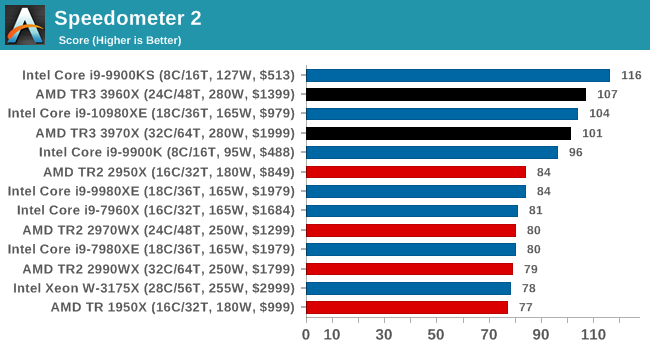
Google Octane 2.0: Core Web Compute
A popular web test for several years, but now no longer being updated, is Octane, developed by Google. Version 2.0 of the test performs the best part of two-dozen compute related tasks, such as regular expressions, cryptography, ray tracing, emulation, and Navier-Stokes physics calculations.
The test gives each sub-test a score and produces a geometric mean of the set as a final result. We run the full benchmark four times, and average the final results.
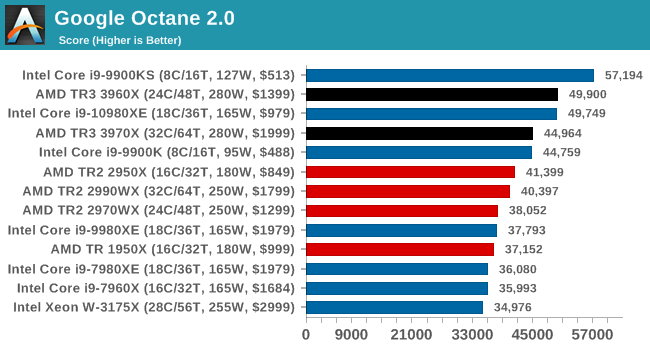
Mozilla Kraken 1.1: Core Web Compute
Even older than Octane is Kraken, this time developed by Mozilla. This is an older test that does similar computational mechanics, such as audio processing or image filtering. Kraken seems to produce a highly variable result depending on the browser version, as it is a test that is keenly optimized for.
The main benchmark runs through each of the sub-tests ten times and produces an average time to completion for each loop, given in milliseconds. We run the full benchmark four times and take an average of the time taken.
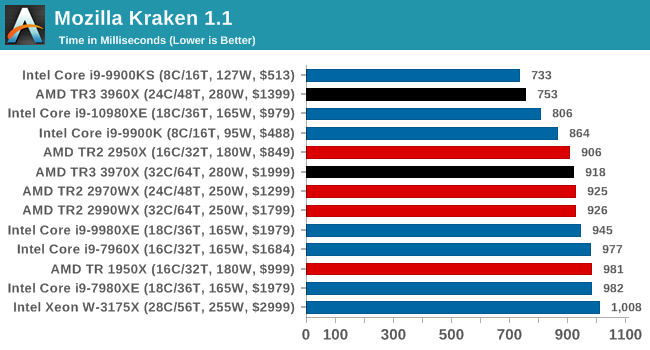
3DPM v1: Naïve Code Variant of 3DPM v2.1
The first legacy test in the suite is the first version of our 3DPM benchmark. This is the ultimate naïve version of the code, as if it was written by scientist with no knowledge of how computer hardware, compilers, or optimization works (which in fact, it was at the start). This represents a large body of scientific simulation out in the wild, where getting the answer is more important than it being fast (getting a result in 4 days is acceptable if it’s correct, rather than sending someone away for a year to learn to code and getting the result in 5 minutes).
In this version, the only real optimization was in the compiler flags (-O2, -fp:fast), compiling it in release mode, and enabling OpenMP in the main compute loops. The loops were not configured for function size, and one of the key slowdowns is false sharing in the cache. It also has long dependency chains based on the random number generation, which leads to relatively poor performance on specific compute microarchitectures.
3DPM v1 can be downloaded with our 3DPM v2 code here: 3DPMv2.1.rar (13.0 MB)
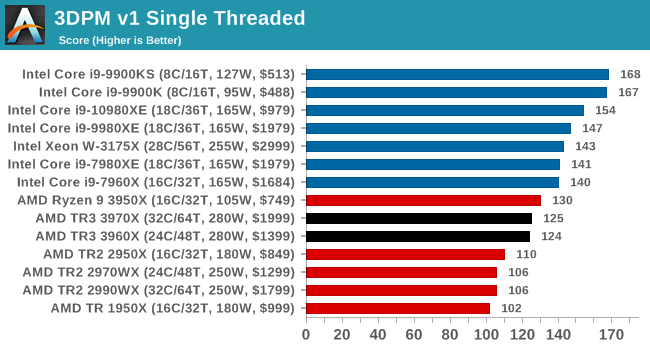
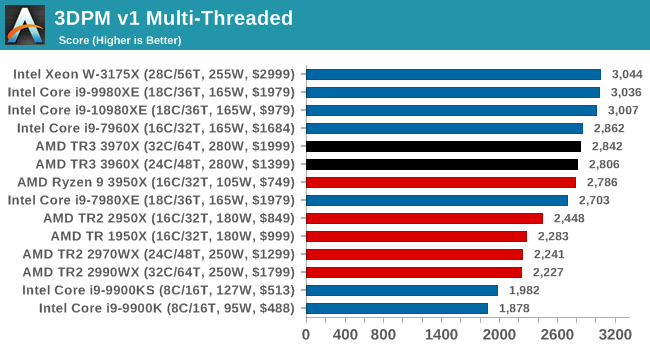
x264 HD 3.0: Older Transcode Test
This transcoding test is super old, and was used by Anand back in the day of Pentium 4 and Athlon II processors. Here a standardized 720p video is transcoded with a two-pass conversion, with the benchmark showing the frames-per-second of each pass. This benchmark is single-threaded, and between some micro-architectures we seem to actually hit an instructions-per-clock wall.
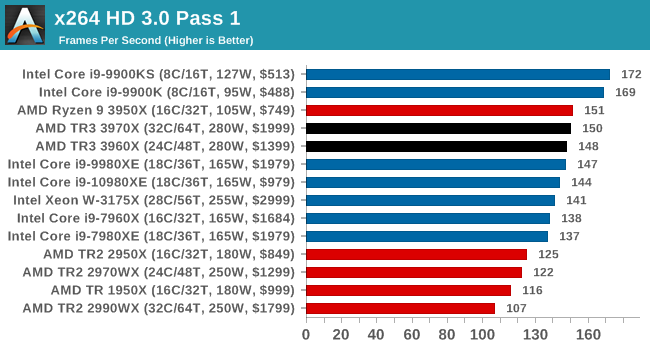
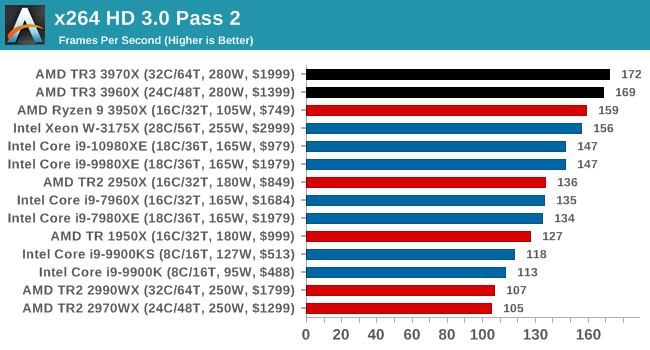
GeekBench4: Synthetics
A common tool for cross-platform testing between mobile, PC, and Mac, GeekBench 4 is an ultimate exercise in synthetic testing across a range of algorithms looking for peak throughput. Tests include encryption, compression, fast Fourier transform, memory operations, n-body physics, matrix operations, histogram manipulation, and HTML parsing.
I’m including this test due to popular demand, although the results do come across as overly synthetic, and a lot of users often put a lot of weight behind the test due to the fact that it is compiled across different platforms (although with different compilers).
We record the main subtest scores (Crypto, Integer, Floating Point, Memory) in our benchmark database, but for the review we post the overall single and multi-threaded results.
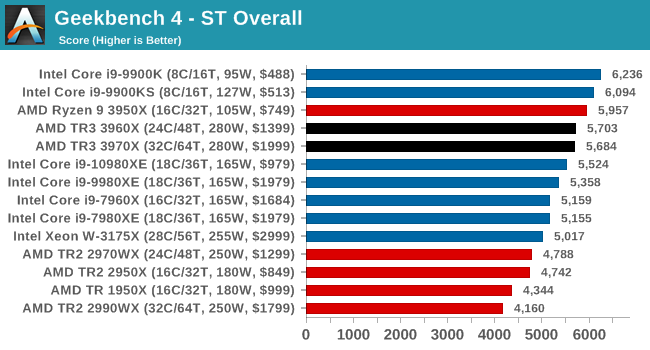
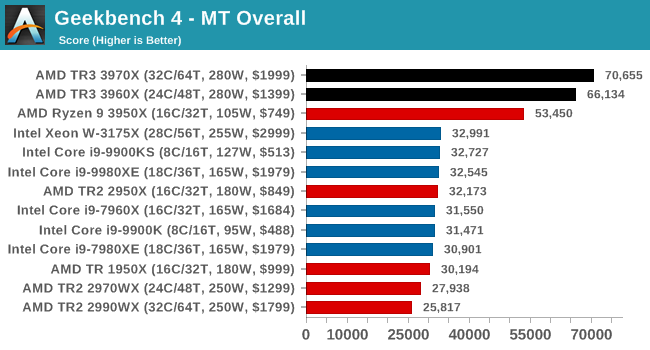










245 Comments
View All Comments
RSAUser - Tuesday, November 26, 2019 - link
I've only seen the Mozilla benchmarks on LTT, very strange that they're the only ones showing such a workload. I'd be very interested on how these chips handle e.g. large SQL Server DB's and requests, especially with those huge caches.The Mozilla benchmark had near 2x the performance for the 3970X vs the 10980X and serve the home has the ryzen chip at near 30 compiles an hour for the Linux Kernel vs around 16 for Intel.
I'd actually be really interested in the financial market for this TR due to the floating point performance increase. We'll probably be upgrading our servers next year based on current projections, so this has been a really nice development.
Dolda2000 - Monday, November 25, 2019 - link
Why is it that Intel gains so incredibly much more from AVX512 than AMD gains from AVX2?In the 3DPM2 test, the AMD CPUs gain roughly a factor of two in performance, which is exactly what I'd expect given that AVX2 is twice as wide as standard SSE. The Intel CPUs, on the other hand, gain almost a factor of 9, which is more than twice what I'd expect given that AVX512 as four times as wide as SSE.
What causes this? Does AVX512 have some other kind of tricks up its sleeves? Does opmasking benefit 3DPM2?
AnGe85 - Monday, November 25, 2019 - link
The Intel parts are derived from Xeon dies (LCC 10 cores, and HCC up to 18 cores). As such they have two AVX-512-FMA-Units.Zen/+ shows a +70 % increase in performance, Zen2 and the 9900K(S) about +90 % with AVX2 in 3DPM2.1 and the Xeon-based parts reach up to +700 %. Ian has obviously done a good job or at least used a good lib ;-)
Dolda2000 - Monday, November 25, 2019 - link
But Zen 1/2 also has two 256-bit FMAs per core. And Intel also has two SSE units per core as well, so I don't see how that would explain the ratios.yeeeeman - Monday, November 25, 2019 - link
Intel has 512bit unitsDolda2000 - Monday, November 25, 2019 - link
Exactly, which should make it 2× as fast, not 4.5×.abufrejoval - Tuesday, November 26, 2019 - link
The other element of magic is typically halved operand size=twice the data element throughput.Could be FP16 vs FP32 in that code, which means 32 vector elements per 512 bit register and then again of these registers there could be mulitples under SIMD per instruction and clock.
Xyler94 - Tuesday, November 26, 2019 - link
Servethehome also mentioned in their reviews of Epyc Rome Processors, the same basic Zen2 platform that the new TR CPUs are made on, that most programs aren't optimized for AMD's new AVX2 pipes, so the results are lower than they should be. I don't know if that's still the case, but it may be a reason why it's showing such a disparity between the two.Slash3 - Monday, November 25, 2019 - link
Wow.Just wow.
shaolin95 - Monday, November 25, 2019 - link
Why wont yuo enable IGPU for the 9900k on the Premiere test? It will change the performance dramatically.